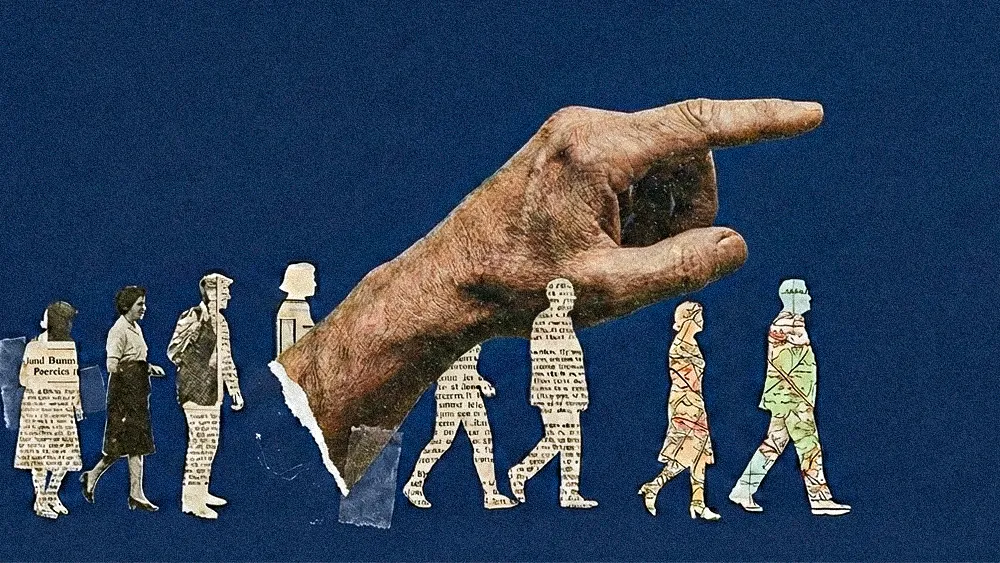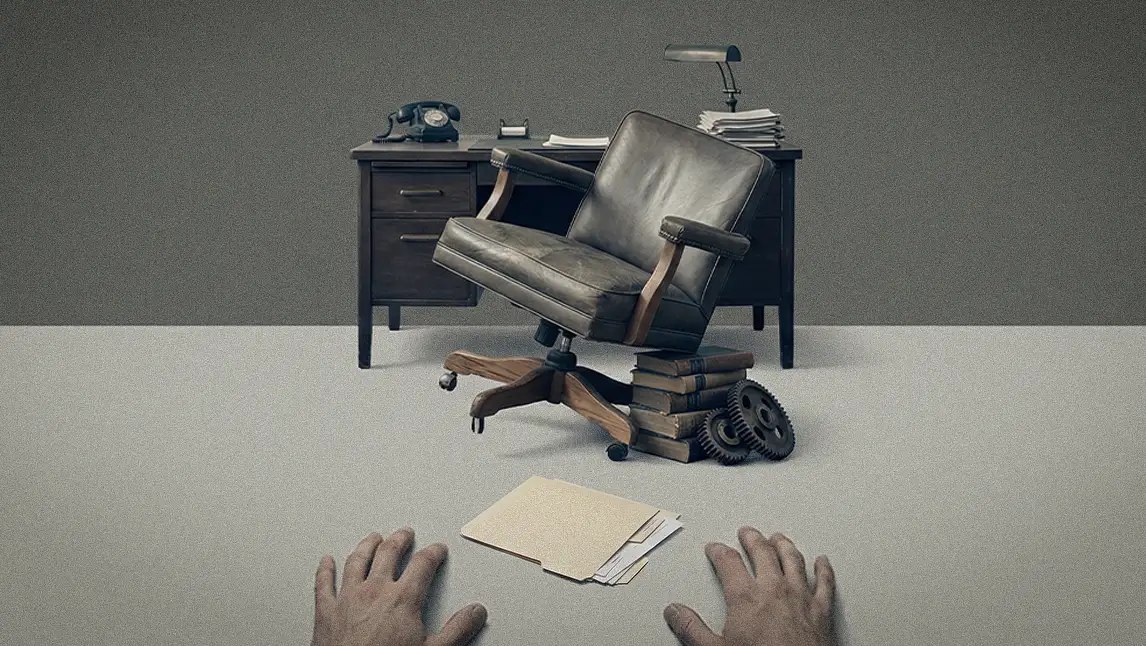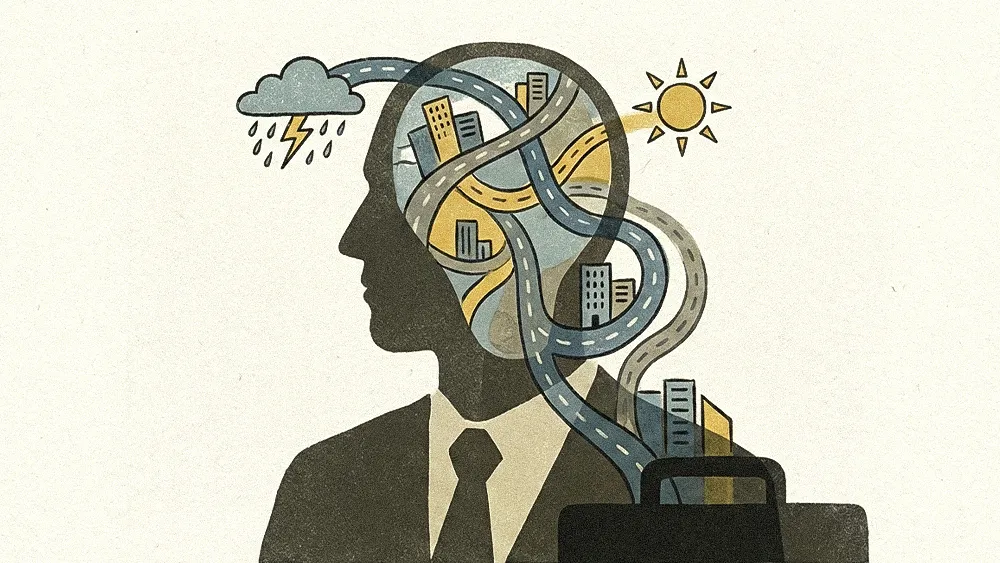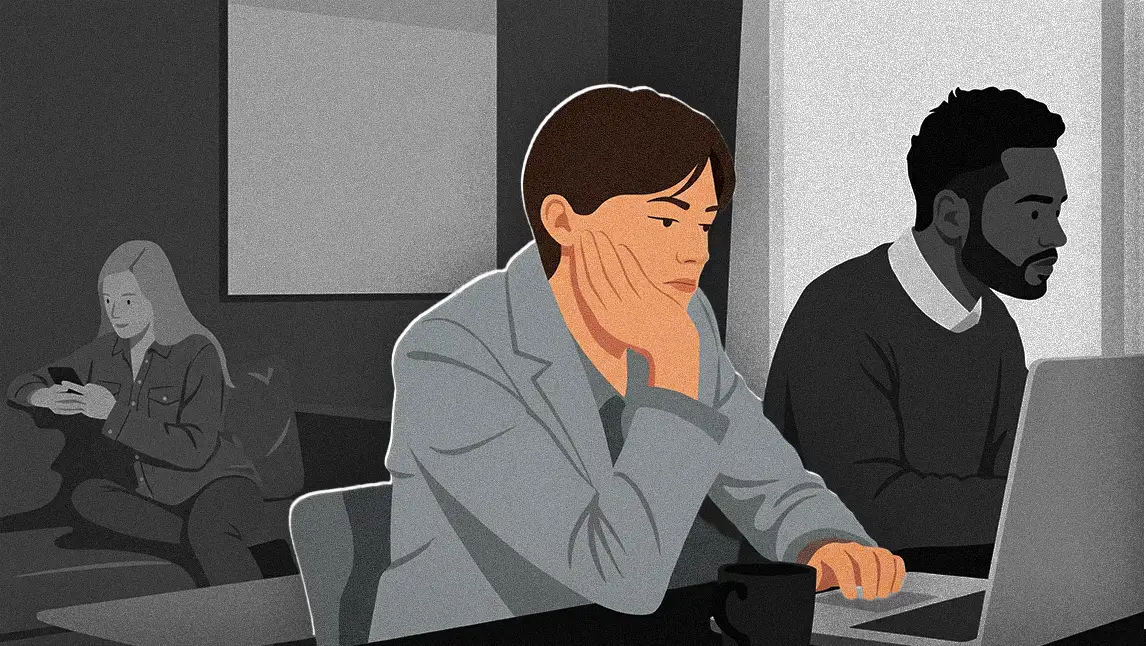New Upwork research says trust defines modern leadership, not control
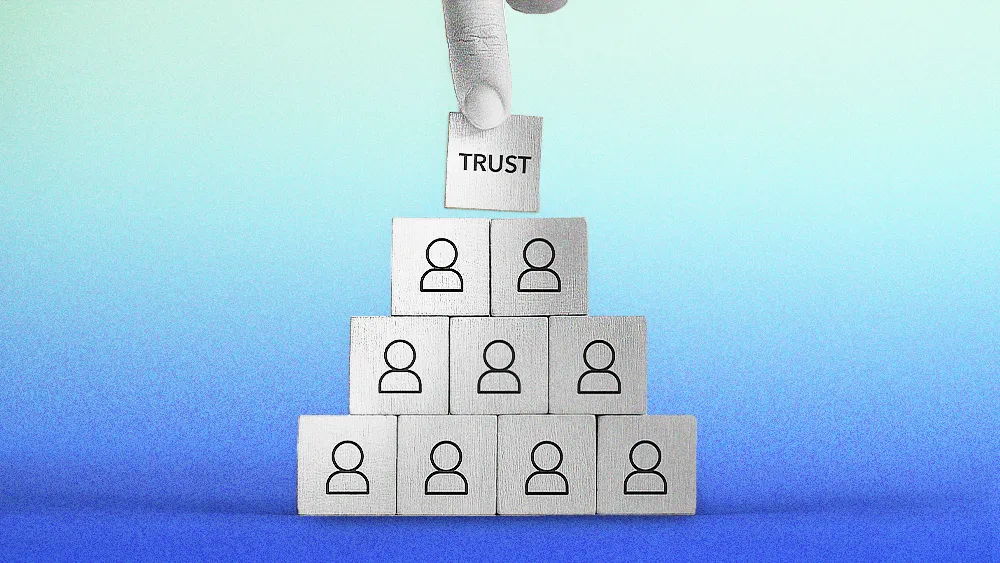
Key Points
With just 19% of U.S. employees trusting leadership, some experts say outdated command-and-control management might be pushing skilled full-time workers toward freelancing.
Kelly Monahan, Managing Director of the Upwork Research Institute, explains why this shift reflects a more profound change in how people are seeking autonomy, transparency, and long-term growth.
To rebuild trust with employees, leaders must learn how to evolve beyond control, treat freelancers as equal contributors, and embrace agility as the foundation of modern business.
I worry leaders are blinded right now by an outdated mindset of, 'A contractor's not going to work as hard. If they were really good, they would have a full-time job.' Those are the type of qualitative cues that I hear in my research that, to me, are a big red flag.

Kelly Monahan
Managing Director
Upwork Research Institute
A deep sense of distrust is redefining the modern workforce. In fact, a recent Gallup poll gives that feeling a number: 19% of U.S. employees trust organizational leadership. Meanwhile, more professionals are starting to freelance for the flexibility, autonomy, and transparency often absent from traditional workplaces. Now, some experts say the two trends are connected by a third: leaders who struggle to adapt as employment contracts evolve.
Faced with such uncertainty about the future, many leaders default to the traditional command-and-control approach. Unfortunately, these types of reactions can stifle the very agility most needed for adaptation. The problem isn’t managing freelancers. It’s modernizing the leadership norms that still treat them as outsiders rather than equals.
Few people study the intersection of trust, technology, and work as closely as Kelly Monahan, Ph.D. As Managing Director of the Upwork Research Institute, Dr. Monahan studies emerging technologies and distributed workforce strategies to understand how leadership mindsets shape organizational resilience. In addition to being an author and keynote speaker, she’s held senior research and leadership positions at major tech companies like Meta, Accenture, and Deloitte. Today, Monahan is one of the leading specialists in the future of work, data analytics, and human-centric leadership. Her most recent research suggests that the real threat to workforce trust is an outdated model of control that no longer fits how people want to work.
“I worry leaders are blinded right now by an outdated mindset of, ‘A contractor’s not going to work as hard. If they were really good, they would have a full-time job.’ Those are the type of qualitative cues that I hear in my research that, to me, are a big red flag,” Monahan says.
A diversification model: The trend is particularly pronounced among Gen Z, she explains, with more than half already freelancing. “When there’s much uncertainty and complexity, what do financial advisers do? They diversify. That’s how we have to think about our careers today. It puts them in the driver’s seats and allows them to diversify and pivot as the market changes.”
But the surge of young professionals into freelancing isn’t a generational whim, Monahan continues. It’s a direct response to recent changes in the corporate world and the fact that management’s thinking hasn’t kept up.
In her book Essential, Monahan explores how leaders facing uncertainty often default to a scarcity mindset. “It’s our human nature to double down on control and compliance,” she explains. The result is a regression to an old playbook of top-down command and a “‘butts in seats’ sort of mindset.”
Today, Monahan sees an outdated bias against non-traditional talent that flows from the same thinking. The traditional career ladder was already faltering, she says. Because corporate entry-level jobs often involve significant administrative work, they frequently leave employees feeling “exhausted, burned out, and not feeling recognized.”
The corporate scapegoat: For years, leaders have prioritized short-term shareholder returns over long-term value creation, Monahan explains. Now, companies are attempting to “cut their way out of growth,” and entry-level jobs are paying the price. “My biggest fear is that the entry-level job will become the scapegoat for workforce reduction. I already see that happening, and it’s shortsighted. That talent is only going to get more expensive,” she says.
A twenty-year-old bias: High-performing organizations want the best skills regardless of employment status, Monahan says. But most leaders still prefer full-time employees. Yet research from the Upwork Research Institute indicates that Gen Z freelancers are nearly twice as likely to hold postgraduate degrees as their full-time counterparts.
Instead, a new model is taking its place. For professionals starting out today, the portfolio model offers a clear advantage, Monahan explains. Here, it’s all about cultivating the entrepreneurial and strategic skills most resistant to automation. Unlike other employees, freelancers manage client relationships and develop business acumen, giving them what she calls “evergreen human business experience.”
Finding a friend in AI: Enabling the new career model is the rise of generative AI, Monahan explains. AI democratizes access to knowledge and helps freelancers become instant experts. “I would not be bullish in a portfolio career without AI, to be honest with you. AI is actually a frontier in helping scale and allow that depth to happen in ways that we haven’t seen before,” she says.
For this new ecosystem to work, however, the relationship between organizations and freelancers must also evolve. The ideal scenario is built on two foundational pillars, Monahan explains.
Relationships grounded in trust: First, to counteract the current “trust crisis,” leaders must move away from a command-and-control mindset, Monahan says. For her, the antidote is a model built on mutual trust, where freelancers are empowered to operate in their “zone of excellence.”
Facilitated knowledge sharing: Beyond trust, organizations must see freelancers as conduits for innovation, she continues. “The real magic happens when freelancers who have more technical skills share knowledge with a full-time employee base.” This infuses the organization with diverse experience and specialized skills from other industries that it would not gain otherwise.
To emphasize the stakes, Monahan points to one final statistic: for the first time in history, just 16% of U.S. workers believe the economy will be better off in the next six months, and only a quarter expect improvement within a year. Executives, on the other hand, are more optimistic—43% forecast improvement within 12 months. ” That disconnect is the crux of why we’ve got to rethink the organizational way of working in talent models. Because clearly, it’s not working.”
My biggest fear is that the entry-level job will become the scapegoat for workforce reduction. I already see that happening, and it's shortsighted. That talent is only going to get more expensive.

Kelly Monahan
Managing Director
Upwork Research Institute
My biggest fear is that the entry-level job will become the scapegoat for workforce reduction. I already see that happening, and it's shortsighted. That talent is only going to get more expensive.

Kelly Monahan
Managing Director
Upwork Research Institute
Related articles
TL;DR
With just 19% of U.S. employees trusting leadership, some experts say outdated command-and-control management might be pushing skilled full-time workers toward freelancing.
Kelly Monahan, Managing Director of the Upwork Research Institute, explains why this shift reflects a more profound change in how people are seeking autonomy, transparency, and long-term growth.
To rebuild trust with employees, leaders must learn how to evolve beyond control, treat freelancers as equal contributors, and embrace agility as the foundation of modern business.

Kelly Monahan
Upwork Research Institute
Managing Director

Managing Director
A deep sense of distrust is redefining the modern workforce. In fact, a recent Gallup poll gives that feeling a number: 19% of U.S. employees trust organizational leadership. Meanwhile, more professionals are starting to freelance for the flexibility, autonomy, and transparency often absent from traditional workplaces. Now, some experts say the two trends are connected by a third: leaders who struggle to adapt as employment contracts evolve.
Faced with such uncertainty about the future, many leaders default to the traditional command-and-control approach. Unfortunately, these types of reactions can stifle the very agility most needed for adaptation. The problem isn’t managing freelancers. It’s modernizing the leadership norms that still treat them as outsiders rather than equals.
Few people study the intersection of trust, technology, and work as closely as Kelly Monahan, Ph.D. As Managing Director of the Upwork Research Institute, Dr. Monahan studies emerging technologies and distributed workforce strategies to understand how leadership mindsets shape organizational resilience. In addition to being an author and keynote speaker, she’s held senior research and leadership positions at major tech companies like Meta, Accenture, and Deloitte. Today, Monahan is one of the leading specialists in the future of work, data analytics, and human-centric leadership. Her most recent research suggests that the real threat to workforce trust is an outdated model of control that no longer fits how people want to work.
“I worry leaders are blinded right now by an outdated mindset of, ‘A contractor’s not going to work as hard. If they were really good, they would have a full-time job.’ Those are the type of qualitative cues that I hear in my research that, to me, are a big red flag,” Monahan says.
A diversification model: The trend is particularly pronounced among Gen Z, she explains, with more than half already freelancing. “When there’s much uncertainty and complexity, what do financial advisers do? They diversify. That’s how we have to think about our careers today. It puts them in the driver’s seats and allows them to diversify and pivot as the market changes.”
But the surge of young professionals into freelancing isn’t a generational whim, Monahan continues. It’s a direct response to recent changes in the corporate world and the fact that management’s thinking hasn’t kept up.
In her book Essential, Monahan explores how leaders facing uncertainty often default to a scarcity mindset. “It’s our human nature to double down on control and compliance,” she explains. The result is a regression to an old playbook of top-down command and a “‘butts in seats’ sort of mindset.”

Kelly Monahan
Upwork Research Institute
Managing Director

Managing Director
Today, Monahan sees an outdated bias against non-traditional talent that flows from the same thinking. The traditional career ladder was already faltering, she says. Because corporate entry-level jobs often involve significant administrative work, they frequently leave employees feeling “exhausted, burned out, and not feeling recognized.”
The corporate scapegoat: For years, leaders have prioritized short-term shareholder returns over long-term value creation, Monahan explains. Now, companies are attempting to “cut their way out of growth,” and entry-level jobs are paying the price. “My biggest fear is that the entry-level job will become the scapegoat for workforce reduction. I already see that happening, and it’s shortsighted. That talent is only going to get more expensive,” she says.
A twenty-year-old bias: High-performing organizations want the best skills regardless of employment status, Monahan says. But most leaders still prefer full-time employees. Yet research from the Upwork Research Institute indicates that Gen Z freelancers are nearly twice as likely to hold postgraduate degrees as their full-time counterparts.
Instead, a new model is taking its place. For professionals starting out today, the portfolio model offers a clear advantage, Monahan explains. Here, it’s all about cultivating the entrepreneurial and strategic skills most resistant to automation. Unlike other employees, freelancers manage client relationships and develop business acumen, giving them what she calls “evergreen human business experience.”
Finding a friend in AI: Enabling the new career model is the rise of generative AI, Monahan explains. AI democratizes access to knowledge and helps freelancers become instant experts. “I would not be bullish in a portfolio career without AI, to be honest with you. AI is actually a frontier in helping scale and allow that depth to happen in ways that we haven’t seen before,” she says.
For this new ecosystem to work, however, the relationship between organizations and freelancers must also evolve. The ideal scenario is built on two foundational pillars, Monahan explains.
Relationships grounded in trust: First, to counteract the current “trust crisis,” leaders must move away from a command-and-control mindset, Monahan says. For her, the antidote is a model built on mutual trust, where freelancers are empowered to operate in their “zone of excellence.”
Facilitated knowledge sharing: Beyond trust, organizations must see freelancers as conduits for innovation, she continues. “The real magic happens when freelancers who have more technical skills share knowledge with a full-time employee base.” This infuses the organization with diverse experience and specialized skills from other industries that it would not gain otherwise.
To emphasize the stakes, Monahan points to one final statistic: for the first time in history, just 16% of U.S. workers believe the economy will be better off in the next six months, and only a quarter expect improvement within a year. Executives, on the other hand, are more optimistic—43% forecast improvement within 12 months. ” That disconnect is the crux of why we’ve got to rethink the organizational way of working in talent models. Because clearly, it’s not working.”
